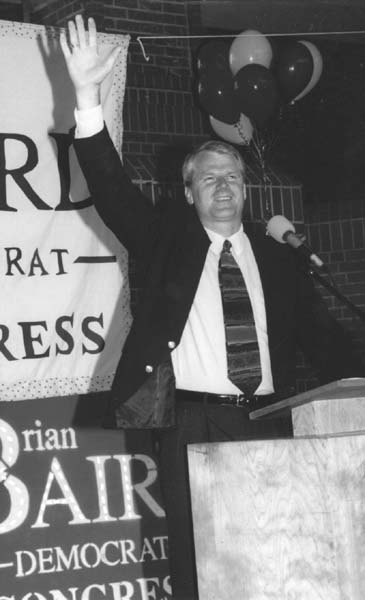
 |
Washington's Baird gears up for second run at CongressPORTLAND, OR -- Brian Baird, candidate for Congress in Washington State's Third District, got better acquainted with Portland-based labor unions last month, speaking to an Oregon AFL-CIO-sponsored symposium on the future of the Bonneville Power Administration. He met with more than 50 unions officials at a breakfast sponsored by the Northwest Oregon Labor Council (NOLC), and addressed affiliates of the Columbia-Pacific Building and Construction Trades Council. Many of the Portland-based local unions have members who live in Washington State's Third Congressional District.
 Brain Baird, candidate for Congress in Washington State's Third District. Exhausted from his first foray into politics, Baird waited just two weeks before recouping and deciding to give it another shot. As soon as Baird made his candidacy official, Smith declared her intent not to seek re-election, but instead run for the U.S. Senate. "I ran the first time because I saw the Gingrich Republicans chipping away at workers' rights: the eight-hour day, health care and benefits.The things I believed in were on the line. Nothing has changed from two years ago," said Baird, 41, a psychology professor at Tacoma's Pacific Lutheran University. He said no one from the Democratic Party gave him any chance of unseating Smith in 1996. "No one except organized labor wanted to listen to me," he told the NOLC crowd. "Unions have a history of fighting against the odds and against big corporations. The unions never gave up on me, and I�m not giving up." Baird has no opposition in the Democratic primary, but four Republicans -- including two candidates from Smith's camp -- want to take him on in the general election. The Washington primary is late (Sept. 15), which doesn't leave much time for raising more money for the November general election. Local unions are requesting that their international union political action committees contribute to the campaign. Baird has a strong union background. His father helped organize teachers in Colorado and later they experienced the hardships of a labor dispute when the National Education Association members struck for several weeks to get better pay. Baird hauled garbage, cleaned forest trails and took other odd jobs to pay for college. He was a Phi Beta Kappa at the University of Utah and he earned a Ph.D in clinical psychology at the University of Wyoming. Baird opposes the North American Free Trade Agreement until it contains provisions for worker and environmental rights. He opposes "right-to-work (for less)" and Social Security privatization. Baird has called for a reinstatement of the deduction for state and local sales taxes in the federal tax code. In states with income taxes, such as Oregon, residents can deduct state income tax paid from their federal tax burden. "Washington taxpayers have been paying more than our fair share for the last decade and it is time that stopped. On a statewide basis, our families are losing millions of dollars annually," he said. Baird also would like to see the Oregon Legislature use income taxes collected from Washington residents who work in Oregon on transportation issues "that mutually benefit both states." On health care, he said arguments claiming America can't pay for universal health care coverage don't wash "because we're already paying for it. Twenty-six percent of health care premiums compensate for the 50 million Americans who don't have health insurance," he said. Baird hired Harry Glaus, a retired business agent of the Teamsters, as his labor liaison.
� Oregon Labor Press Publishing Co. Inc.
|